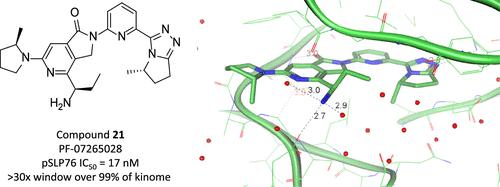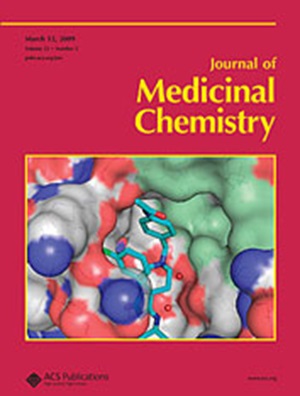造血祖激酶1 (HPK1)选择性小分子抑制剂PF-07265028治疗癌症的发现
IF 6.8
1区 医学
Q1 CHEMISTRY, MEDICINAL
引用次数: 0
摘要
造血祖激酶1 (HPK1/MAP4K1)是通过免疫介导机制治疗癌症的一个重要靶点。在此,我们介绍了内酰胺/azalactam系列抑制剂的药物发现活动的亮点,这些抑制剂产生了一个小分子(21,PF-07265028),该药物已进入1期临床试验(NCT05233436)。发现工作的关键组成部分包括通过使用共晶结构来减少配体菌株来优化效力,减轻ADME负担(血浆不稳定性和CYP2D6的部分代谢),以及优化激酶选择性,特别是对与HPK1高度同源的免疫调节激酶。基于结构的药物设计通过利用共晶结构和亲脂性效率分析被证明是有价值的工具,最终能够提供临床质量的HPK1小分子抑制剂。本文章由计算机程序翻译,如有差异,请以英文原文为准。

Discovery of PF-07265028, A Selective Small Molecule Inhibitor of Hematopoietic Progenitor Kinase 1 (HPK1) for the Treatment of Cancer
Hematopoietic progenitor kinase 1 (HPK1/MAP4K1) represents a high interest target for the treatment of cancer through an immune-mediated mechanism. Herein we present highlights of the drug discovery campaign within the lactam/azalactam series of inhibitors that yielded a small molecule (21, PF-07265028), which was advanced to a phase 1 clinical trial (NCT05233436). Key components of the discovery effort included optimization of potency through mitigation of ligand strain as guided by the use of cocrystal structures, mitigation of ADME liabilities (plasma instability and fraction metabolism by CYP2D6), and optimization of kinase selectivity, particularly over immune-modulating kinases with high homology to HPK1. Structure-based drug design via leveraging cocrystal structures and lipophilic efficiency analysis proved to be valuable tools that ultimately enabled the delivery of a clinical-quality small molecule inhibitor of HPK1.
求助全文
通过发布文献求助,成功后即可免费获取论文全文。
去求助
来源期刊

Journal of Medicinal Chemistry
医学-医药化学
CiteScore
4.00
自引率
11.00%
发文量
804
审稿时长
1.9 months
期刊介绍:
The Journal of Medicinal Chemistry is a prestigious biweekly peer-reviewed publication that focuses on the multifaceted field of medicinal chemistry. Since its inception in 1959 as the Journal of Medicinal and Pharmaceutical Chemistry, it has evolved to become a cornerstone in the dissemination of research findings related to the design, synthesis, and development of therapeutic agents.
The Journal of Medicinal Chemistry is recognized for its significant impact in the scientific community, as evidenced by its 2022 impact factor of 7.3. This metric reflects the journal's influence and the importance of its content in shaping the future of drug discovery and development. The journal serves as a vital resource for chemists, pharmacologists, and other researchers interested in the molecular mechanisms of drug action and the optimization of therapeutic compounds.
 求助内容:
求助内容: 应助结果提醒方式:
应助结果提醒方式:


